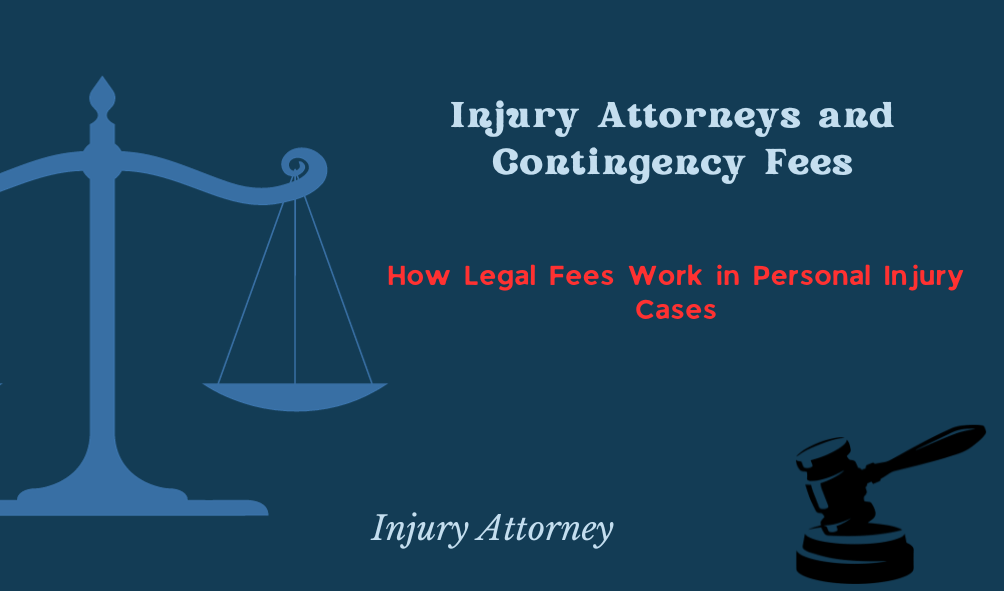Injury Attorneys and Contingency Fees: How Legal Fees Work in Personal Injury Cases
When you’ve suffered an injury due to someone else’s negligence, seeking justice and compensation is essential to your recovery. However, concerns about legal fees can often deter individuals from seeking the help of a qualified injury attorney. The good news is that many personal injury attorneys work on a contingency fee basis, making legal representation accessible to those in need. This comprehensive guide delves into contingency fees, explaining how they work, the benefits they offer, and what you can expect when hiring an injury attorney to champion your case.
Content Outline
- Introduction
- Setting the stage for understanding contingency fees in personal injury cases.
- A brief overview of what the article will cover.
- What Are Contingency Fees?
- Defining contingency fees and their significance in personal injury cases.
- How this payment structure differs from traditional hourly fees.
- The Benefits of Contingency Fees
- Exploring the advantages of choosing an attorney who works on a contingency basis.
- How it aligns the attorney’s interests with your pursuit of justice.
- The Initial Consultation: No Upfront Costs
- Detailing the first steps when consulting with an injury attorney.
- What to expect during the initial meeting and the absence of upfront costs.
- The Contingency Fee Agreement
- Breaking down the elements of a contingency fee agreement.
- How fees are calculated as a percentage of the final settlement or court award.
- Transparency in Legal Costs
- Discussing the importance of transparency in contingency fee arrangements.
- The responsibility of attorneys to provide clear fee structures.
- When Do You Pay?
- Clarifying when and how contingency fees are paid.
- The role of expenses and costs related to your case.
- The Attorney’s Motivation
- Exploring how the contingency fee model aligns the attorney’s motivation with the client’s success.
- The determination to win, as it directly affects the attorney’s compensation.
- The Risk Factor
- Acknowledging the risks involved for attorneys in contingency fee cases.
- Why attorneys carefully select cases they believe in.
- Conclusion
- Summarizing key points about contingency fees and their benefits.
- Encouraging individuals to seek legal guidance without the burden of upfront costs.
What Are Contingency Fees?
In personal injury law, contingency fees are a payment structure where the attorney’s fees are contingent on the case’s outcome. In other words, the attorney only gets paid if they successfully secure compensation for you. This arrangement offers a unique advantage, allowing individuals to access legal representation without paying upfront or hourly fees.
The Benefits of Contingency Fees
Contingency fees offer several benefits for individuals seeking legal recourse in personal injury cases:
- Access to Legal Representation: Individuals with limited financial resources can still access experienced legal representation.
- Aligned Interests: Attorneys are motivated to secure the highest possible compensation since their fees are tied to the outcome.
- Risk Reduction: Clients don’t face the financial risk of paying attorney fees if the case is unsuccessful.
The Initial Consultation: No Upfront Costs
The journey towards justice begins with an initial consultation with an injury attorney. Importantly, this consultation comes at no upfront cost to you. During this meeting:
- Case Evaluation: The attorney assesses the merits of your case and discusses potential strategies.
- Clear Communication: You’ll have the opportunity to discuss your concerns and objectives.
The Contingency Fee Agreement
The cornerstone of the contingency fee arrangement is the contingency fee agreement. This agreement outlines the terms of payment, including:
- Percentage of Recovery: The attorney’s fees are typically calculated as a percentage of the final settlement or court award.
- Expenses: The agreement may specify how expenses related to your case, such as court fees and medical records, will be handled.
Transparency in Legal Costs
Transparency is crucial in contingency fee arrangements. Attorneys are obligated to provide clear and understandable fee structures. Clients need to understand what they will be charged and under what circumstances.
When Do You Pay?
In a contingency fee arrangement, you only pay your attorney’s fees if they succeed in obtaining compensation for you. You generally do not owe any legal fees if the case is unsuccessful. This offers peace of mind and reduces the financial risk for clients.
The Attorney’s Motivation
The contingency fee model aligns the attorney’s motivation with the client’s success. The attorney’s income is directly tied to the compensation they secure for you, motivating them to work diligently and ensure the highest possible settlement or court award.
The Risk Factor
Contingency fees also come with risks for attorneys. They invest their time and resources into cases and only get paid when they win. As a result, attorneys carefully select cases they believe in, ensuring they have a strong chance of success.
Conclusion
Contingency fees in personal injury cases are valuable for individuals seeking justice and compensation. This payment structure offers access to experienced legal representation without the burden of upfront or hourly fees. Attorneys working on a contingency basis are highly motivated to secure the best possible outcome for their clients. If you’ve been injured due to someone else’s negligence, don’t hesitate to seek the guidance of an injury attorney who can champion your case without worrying about upfront costs. This way, you can focus on your recovery while your attorney fights for the justice and compensation you deserve.
